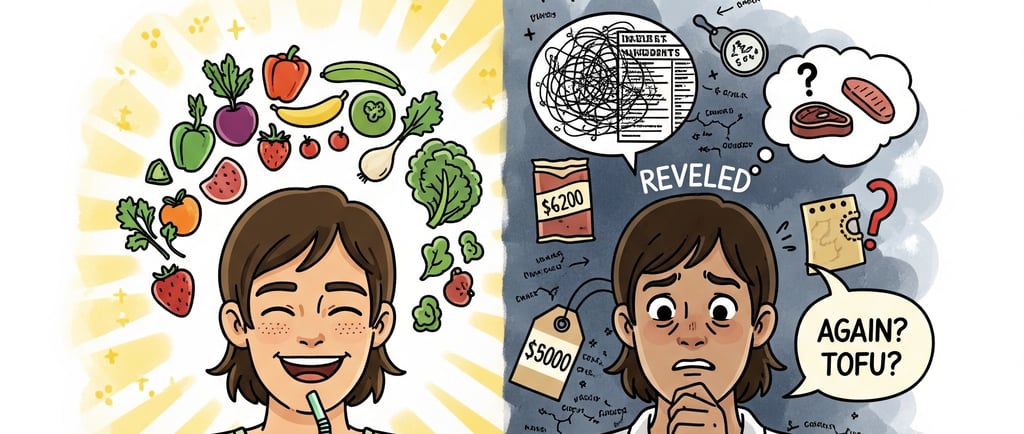What They Don't Tell You Before You Go Vegan
Going vegan is often celebrated as a powerful, positive lifestyle choice that benefits your health, the environment, and animals. However, before diving headfirst into this plant-based lifestyle, there are some important realities and challenges many don’t talk about. Knowing these ahead of time can help you prepare better and make your vegan journey smoother and more sustainable.
NON-STOIC PHILOSOPHIES
8/9/20252 min read


1. It’s a Lifestyle Change, Not Just a Diet
Many people think going vegan is simply about avoiding meat or dairy. In truth, being vegan often means rethinking your entire lifestyle: what you eat, what you wear, how you shop, and even how you socialize. It’s a big shift that takes time to adjust to, so patience is key. Expect some growing pains as you get used to new habits and products.
2. There May Be Social Challenges
Going vegan can cause friction in social situations—family dinners, eating out with friends, holiday gatherings. Some people might not understand or respect your choice, and you may have to explain yourself again and again. Preparing for these conversations and having strategies to stay confident and polite can make a big difference.
3. Nutrition Requires Attention
While a vegan diet can be very healthy, it’s important to plan your nutrition carefully. Certain nutrients like Vitamin B12, iron, omega-3 fatty acids, and protein might require conscious effort to get enough of from plant sources or supplements. Without planning, it’s easy to end up with deficiencies that affect your energy or health.
4. Convenience May Be Harder at First
Depending on where you live, finding tasty and nutritious vegan options might be tricky, especially when eating out or traveling. Processed “vegan” snacks can fill the gap but aren’t always healthy. Developing a core pantry of whole-food essentials and learning simple recipes will help build a reliable routine.
5. You Might Experience Body Adjustments
Switching to a vegan diet means a sudden increase in fiber and plant-based nutrients. It’s normal to face changes like bloating, changes in digestion, or fluctuations in energy levels as your body adapts. These usually pass with time but can feel challenging initially.
6. It’s Not About Perfection
Many new vegans feel pressure to be 100% perfect right away. But it’s okay to take your time, make mistakes, and gradually transition. Some even find success with a flexible approach—like starting with “meatless Mondays” or cutting dairy first. Remember, the goal is progress, not perfection.
7. Mental Motivation Is Crucial
Going vegan often starts with a strong ethical or health motivation. But sustaining it long-term takes mental resilience. There will be temptations, setbacks, and moments of doubt. Connecting with supportive communities—online or offline—and constantly reminding yourself why you chose this path makes all the difference.
8. It Can Be Cost-Effective but Sometimes Expensive
You can absolutely eat vegan on a budget by focusing on whole foods like beans, rice, legumes, and seasonal veggies. However, specialty vegan products, supplements, and dining out at vegan-friendly restaurants can add up. Planning and smart shopping help keep expenses manageable.
Final Thoughts
Going vegan is a rewarding journey filled with learning and growth—but it’s not always easy or straightforward. Being prepared for the challenges, focusing on balanced nutrition, and allowing yourself space to adapt will help you thrive. Remember, every plant-based meal you eat is a step toward positive change—for your health, the planet, and the animals.
Waste no more time arguing about what a good man should be. Be one - Marcus Aurelius
We suffer more often in imagination than in reality - Seneca
Wealth consists not in having great possessions, but in having few wants - Epictetus
